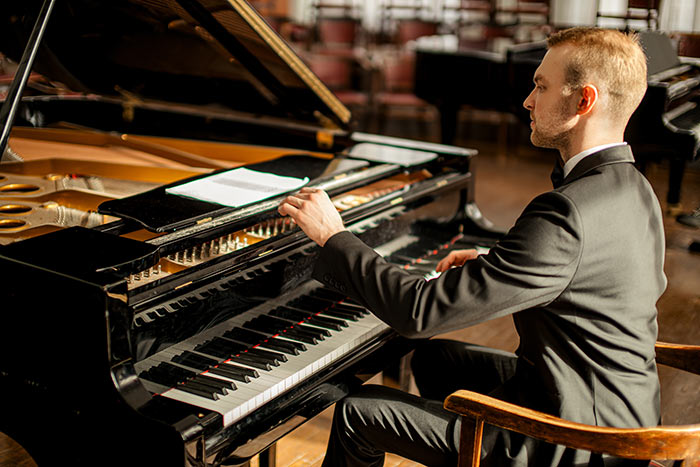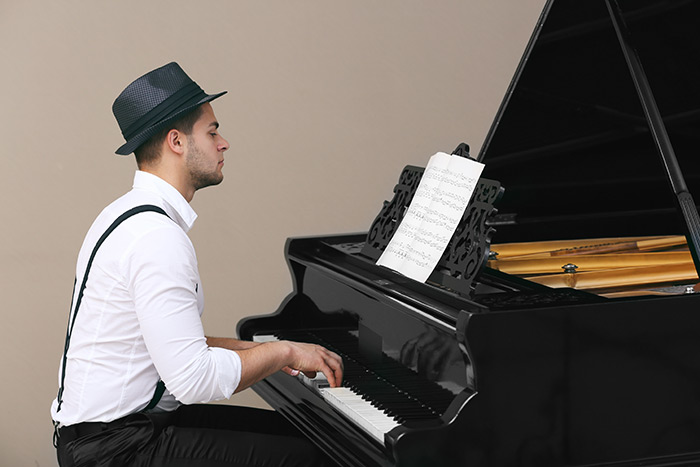Improving your memory can be a great way to enhance your piano-playing skills and I am here to provide you with a few tips to achieve just that.
Practice Regularly
Consistent practice is crucial for improving your memory when learning to play the piano. When you practice the same pieces repeatedly, you are strengthening the neural connections in your brain that are responsible for muscle memory. This allows your fingers to move easily and smoothly over the keys, making it less challenging for you to recall the notes and fingerings as you play. In order to see results, try to practice for at least 20-30 minutes a day, ideally every day, and set a consistent practice schedule.
Break Up Your Practice Sessions
Instead of having one long practice session, try breaking it up into shorter, more frequent sessions. This will give your brain the opportunity to process the information it has learned, rather than overwhelming it with too much at once. It also makes it easier to recall what was learned since the last practice session. Efficiency is key
Use Mnemonic Devices
Mnemonic devices can be extremely helpful when learning the piano. These devices are memory aids that help you associate information with something more memorable. For example, you can associate each piano key with a word or phrase that starts with the letter of the note, such as “All Cows Eat Grass” for the left hand notes that land on spaces. Or you can use a visual image like “a bird flying up in the sky” for ascending scales. This can make it much easier to remember the notes and patterns as you play.
Practice Visualisation
Visualisation is a powerful memory technique that can help you to improve your piano playing skills. By picturing the piano keys in your mind and imagining yourself playing the notes, you can strengthen the neural connections in your brain and make it easier to recall the notes as you play. Before practice, take a moment to visualise the piece you are going to play, and imagine yourself playing it flawlessly. Repeat this visualisation during practice. You don’t always need to be at a piano to study your score.
Use Spaced Repetition
Spaced repetition is a technique where you revisit material at increasing intervals. By breaking up your practice time and revisiting the same pieces, your brain will be more likely to remember the information long-term. For example, you can practice a piece for 10 minutes today, 20 minutes in two days, 30 minutes in a week. And so on. This way your brain is given time to rest and process the information.
Get a Good Night’s Sleep
Sleep is crucial for memory consolidation. When you sleep, your brain is processing the information you’ve learned during the day, and consolidating it into long-term memories. Make sure to get at least 7-8 hours of sleep each night, especially on the nights before practice days. This can help you to perform better and retain the information better. As well, when you are more awake you are more alert, which allows yourself to concentrate for longer time spans.
Take Breaks
It is important to take regular breaks during practice sessions, to give your brain a chance to process the information it has learned. If you are feeling overwhelmed, or if your mind is starting to wander, take a break and come back to your practice session refreshed.
Repetition
Repetition is key when it comes to improving memory when learning the piano. The more you repeat the material you are learning, the better you will be able to remember it. This is why it is important to practice regularly, focusing on repetition to strengthen your understanding of the material. As well, look at your piece in small chunks rather than as a story, this will allow your brain to focus clearly on points and remember these smaller sections.
Listen And Play Along To Recordings
Listening to recordings of the pieces you are learning can be a great way to improve your memory. When you listen to the piece being played correctly, your brain can better process and understand the piece, making it easier to recall and play later. Additionally, playing along with a recording can help you internalise the rhythm and phrasing of the piece.
Learn The Music Theory Behind The Pieces
Understanding the theory behind the pieces you’re learning can greatly improve your memory and make it easier to play. By understanding the structure and harmony of the piece, you can better anticipate what comes next, making it easier to recall and play the piece.
Use Memory Games
Memory games can be a fun way to improve your memory while learning the piano. There are various games available such as flashcards, matching games, memory puzzles etc. to test your recall of musical notes, chords, keys and scales. By making your practice more enjoyable, your are more likely to be stimulated and remember what you have just completed.
These are just a few tips for how to improve your memory for learning the piano. Remember, the key to success is to practice regularly and use techniques that work for you. With time, patience, and dedication, you will be able to improve and become a better pianist.
If you enjoy our articles and are feeling inspired to start piano lessons then don’t hesitate and contact us to find out more info. We have a great group of professional, motivating and friendly teaches that would love to help you on your musical journey.












